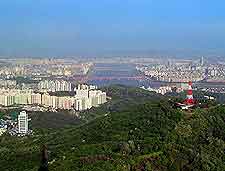Medical Tourism, Treatments and Surgery in Seoul
(Seoul, South Korea)

The massive metropolis of Seoul is the economic and cultural hub of South Korea, and an ever fascinating destination of visitors from all over the world. Although medical tourism hasn't been a major draw to the city, private hospitals and medical expertise are more than able to provide excellent and cost-effective services.
The Korean government is participating actively in the development of medical tourism facilities and has established collaborative links with groups such as the Korean International Medical Service Association, linked with the Health and Welfare Ministry. The initiative is aimed at providing packages in Seoul through specialist travel agencies, backed by foreign insurance companies.
South Korea has an ancient and fascinating history, revealed in its full glory in Seoul's palaces, temples and heritage sites, and the resorts of the South China sea coast are a short journey away. Transportation in and around the city is ultra-modern and the city's hotels, dining and shopping facilities are among the best in Asia. Add to all this the financial benefits of first-class treatments in Seoul hospitals for far less than at home, and medical tourism here makes a great deal of sense.
Advantages of Medical Tourism
As a centre for medical tourism, Seoul offers a high level of expertise and experience in all sectors, and is also concentrating on treatments involving traditional Korean medicine, based on thousands of years of knowledge of both local remedies and traditional Chinese medicine. As regards the training of its medical staff, South Korea is a first world country with higher education facilities to match. In addition, many specialists and surgeons in Seoul have trained and worked in the US.
Unlike some South-East Asian destinations, English is widely spoken, understood and appreciated as the world language of communication, reducing the possibility of misunderstandings or mistakes. Seoul's state-of-the-art medical and surgical technology is on par with that in Western private hospitals, as is the standard of treatment available. Medical tourists here can expect first-class accommodation, before, during and after surgery in Seoul, as well as tasty food and great service throughout their stay.
Medical Procedures
Spinal care in Seoul is one of the specialties here, both in its conventional and traditional treatment. From minimally invasive laser or endoscopic surgery to disc replacement, pain management and physiotherapy, all treatments offered are fully researched, with providers now recognised throughout Asia.
Seoul is becoming a popular destination for specialist dental surgery, including maxillofacial surgery, periodontics, implants, bridges and root canal work. Dental surgeons in this field are bilingual and the clinics serve an international clientele. Seoul is also recognised worldwide in the fields of plastic surgery, skin care and ophthalmic treatments, as well as in oriental medicine and combined occidental / oriental treatments.
Hospitals
Since the recent establishment of the Korean government's one-stop-shop initiative on medical tourism, the best hospitals for diverse treatments are much easier to locate by a quick visit to the Korean tourism website. The Wooridul Hospital is a leader in the field of spinal surgery in Seoul and this facility also treats cancer patients in its specialised clinic, using the latest techniques and equipment.
The Severance Hospital at Seoul's University College of Medicine has a diverse range of specialist clinics including cardiovascular, organ transplant, cancer, infertility and dental care. Also of note is the Seoul National University Hospital, which boasts a specialist children's hospital, as well as offering orthopaedic, cardiovascular and general surgery.
Both the Wooridul and the Kyunghee University Medical Centre have dedicated oriental medicine centres, and all private hospitals in Seoul offer comprehensive health screening services and private rooms or suites with all modern conveniences. Multi-disciplinary conferences between different departments, to determine the best overall treatment for each patient, are common practice here.
 The massive metropolis of Seoul is the economic and cultural hub of South Korea, and an ever fascinating destination of visitors from all over the world. Although medical tourism hasn't been a major draw to the city, private hospitals and medical expertise are more than able to provide excellent and cost-effective services.
The massive metropolis of Seoul is the economic and cultural hub of South Korea, and an ever fascinating destination of visitors from all over the world. Although medical tourism hasn't been a major draw to the city, private hospitals and medical expertise are more than able to provide excellent and cost-effective services.